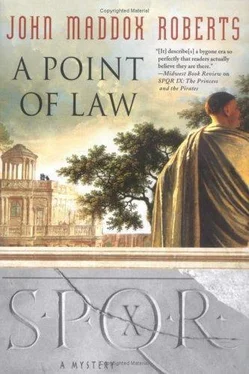John Roberts - A Point of Law
Здесь есть возможность читать онлайн «John Roberts - A Point of Law» весь текст электронной книги совершенно бесплатно (целиком полную версию без сокращений). В некоторых случаях можно слушать аудио, скачать через торрент в формате fb2 и присутствует краткое содержание. Год выпуска: 0101, ISBN: 0101, Издательство: St. Martin, Жанр: Исторический детектив, на английском языке. Описание произведения, (предисловие) а так же отзывы посетителей доступны на портале библиотеки ЛибКат.
- Название:A Point of Law
- Автор:
- Издательство:St. Martin
- Жанр:
- Год:0101
- ISBN:9780312337254
- Рейтинг книги:5 / 5. Голосов: 1
-
Избранное:Добавить в избранное
- Отзывы:
-
Ваша оценка:
- 100
- 1
- 2
- 3
- 4
- 5
A Point of Law: краткое содержание, описание и аннотация
Предлагаем к чтению аннотацию, описание, краткое содержание или предисловие (зависит от того, что написал сам автор книги «A Point of Law»). Если вы не нашли необходимую информацию о книге — напишите в комментариях, мы постараемся отыскать её.
A Point of Law — читать онлайн бесплатно полную книгу (весь текст) целиком
Ниже представлен текст книги, разбитый по страницам. Система сохранения места последней прочитанной страницы, позволяет с удобством читать онлайн бесплатно книгу «A Point of Law», без необходимости каждый раз заново искать на чём Вы остановились. Поставьте закладку, и сможете в любой момент перейти на страницу, на которой закончили чтение.
Интервал:
Закладка:
“The furnishings of that house,” I said, “the desk and the inkstand, for instance-those were the sort of things wealthy men give to one another as gifts for Saturnalia or as guest gifts or to celebrate the naming of sons. What was a man like Fulvius doing with such possessions?”
“Maybe they were loaned to him,” Hermes said, around a greasy mouthful, which he finally swallowed. “If Marcellus lent him the house, why not the furnishings as well?”
“But why would he do that? Why did he want Fulvius to put up such a fine front?”
“You could go ask him.”
“Something tells me that would not be a wise move just now.” I weighed the ring in my hand. The fine, strange granulation of its surface gave it an exotic look. I knew I had seen such metal work before, but I did not remember where. “You could buy a decent house with this and have enough left over to staff it with slaves. How did he get it, and why wasn’t he wearing it?”
Hermes thought about this. “Could be he was waiting to gain the reputation to go with it, just like the senator’s tunic and the toga praetexta . A nobody like him standing for tribune or quaestor would look like a fool wearing such a ring. It would be right at home on a praetor’s hand.”
“That’s a thought. It makes me wonder who could dangle such prizes in front of him.”
“Caesar could,” Hermes said. “Or Pompey. They’ve both been known to raise obscure men to high office and power.”
“Ridiculous!” I said. “Those two would never-”
“I just meant,” Hermes went on, “that they are the type of men to do such a thing. And there are more ways of rising in the world than through birth or politics. Look at me. All my life I was a slave. Now I am a citizen with the name of a great family, which my descendants will inherit. This happened because you wanted it to. The lives of humble men are there for great men to make use of. We needn’t wonder that it is done. We just need to discover the reason.”
“You’re uncommonly thoughtful today,” I said, taken a little aback.
“Well, I don’t carry your bath things around anymore, so I might as well do some of your thinking for you.”
I brushed crumbs from my hands and downed the last of the wine. “Come on, let’s see if we can find someone who can tell us about this ring.” We gave our cups back to the vendor and walked across the street.
The year’s guild master, a man named Laturnus, recognized me the moment I walked in. His office was laid out almost like a shop: a single, long room opening onto a courtyard, the whole upper half of the wall on that side open to admit maximum light. Except for chairs, the only furnishing of the room was a single, long table. It held a balance and selection of official weights, a touchstone, and a case holding samples of pure gold and silver and all the alloys of those metals. I could see that most of the business done here consisted of settling disputes concerning the purity of gold being sold in Rome. There were very strict laws regulating this, and the guild was held responsible for its members’ honesty.
“Senator! Or should I say Praetor?” He took my hand and guided me to a comfortable chair. “How good it is to see you!” He was a fat man with keen eyes and nimble hands, both requirements of his craft. “I suppose you’ve come to discuss next year’s legislation?”
My mind, distracted by other matters, failed to grasp his meaning. “Legislation?”
He was puzzled. “Why, yes. You will surely be holding court next year. And we will also have new censors. If Appius Claudius is elected censor, and surely he shall be, he plans to institute a new slate of antiluxury laws. I, and the members of my guild, feel that these laws will be a very bad idea.”
“I couldn’t agree more,” I said. “But the praetors have no power over acts of the censors. Since you goldsmiths deal in the marketplace, your cases are heard by the aediles and they will be enforcing any decrees of the censors.”
“Of course, you are right,” he said, with a flutter of the fingers, “but the aediles and the praetors often work closely together, as your jurisdictions sometimes overlap.”
“Certainly,” I said, “and I assure you that I shall look with great leniency on frivolous accusations of luxury-law violations. Somehow I do not believe that the prime threat to the Republic comes from how many rings a man wears or the weight of gold around his wife’s neck. I plan to dismiss out of hand all cases except those involving serious crime.”
“We shall all be most grateful,” he assured me, meaning that he would pass the word and I could expect a fine price break for any jewelry I bought from a guild member.
“Your best bet though,” I advised him, “is to cultivate the other censor. He can overrule Appius’s acts.”
“Oh, believe me, we are doing just that. Calpurnius Piso is most likely to be elected, and he is a man, how shall we say, amenable to persuasion. But he will have very weighty matters on his mind next year, and he may be fully occupied trying to protect his friends whom Appius Claudius plans to expel from the Senate.”
“The Senate is in severe need of pruning,” I said. “But I’ve recently spoken with Appius, and he seems far more concerned about the indebtedness of the senatorial class than about luxury per se.”
“Let us hope,” said Laturnus.
“Now, my friend,” I said, “what I came here to inquire about is this.” I took the heavy ring from my tunic and handed it to him. “Can you tell me anything about this?”
He took it, stepped closer to the open wall to catch the best light. “A lovely piece. It’s very old.”
“How can you tell?”
“It’s Etruscan work. This granulation of the surface is quite unique, and the art of making it has been lost for generations.”
That explained it. I’d seen that surface before, many times, on old bronze lamps and vessels, always of Etruscan make. “Why is it no longer done?”
“It was probably only done by a few families, and the families died out without passing the secret on. The granulation is not chased onto the surface with gravers, as such surfaces are done now. First, they made thousands of minute, gold beads, all exactly the same size. That, too, is a lost art. Then the roughened surface of the piece-the ring, in this case-was prepared with a layer of the finest solder.” His voice grew wistful, explaining the arcana of his vocation.
“Then the tiny beads were laid atop the solder, one at a time. This task was so demanding that it is said only children could do it properly. No one older than ten or twelve at the oldest, had the eyesight and the lightness of touch to accomplish it. Then, without disturbing the surface preparation, the piece was put into a furnace. It had to be removed the instant the temperature was perfect. Remove it too soon and the solder would not hold. Leave it too long and the solder would run off, taking the granulation with it. There were a hundred stages at which work this delicate could be ruined. It is amazing that any saw completion at all. But, when done properly, the effect is incomparable. Modern granulation work done with a graver or chisel is gross and coarse by comparison.”
“The stone looks Greek,” I said.
“It is. But the old Etruscans often incorporated Greek work into their own, just as we do today. Or, this could be a modern stone set into an old Etruscan ring. For that you will need to consult a lapidary. It is not my field.”
I took the ring back from him. “Many thanks, Laturnus. I believe that your guild and my future office will enjoy the most excellent of relations.” I rose from my chair.
“I rejoice to hear it. Why, if I may ask, is the origin of this ring of interest to you?”
Читать дальшеИнтервал:
Закладка:
Похожие книги на «A Point of Law»
Представляем Вашему вниманию похожие книги на «A Point of Law» списком для выбора. Мы отобрали схожую по названию и смыслу литературу в надежде предоставить читателям больше вариантов отыскать новые, интересные, ещё непрочитанные произведения.
Обсуждение, отзывы о книге «A Point of Law» и просто собственные мнения читателей. Оставьте ваши комментарии, напишите, что Вы думаете о произведении, его смысле или главных героях. Укажите что конкретно понравилось, а что нет, и почему Вы так считаете.









